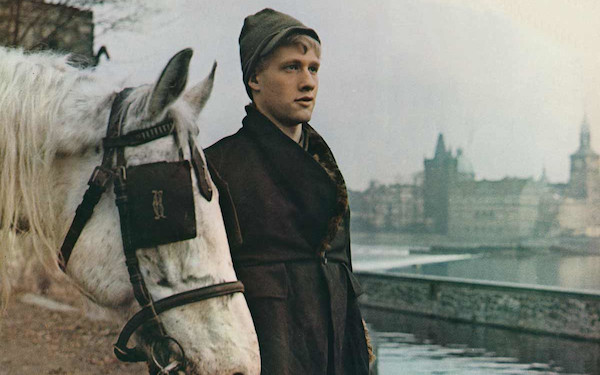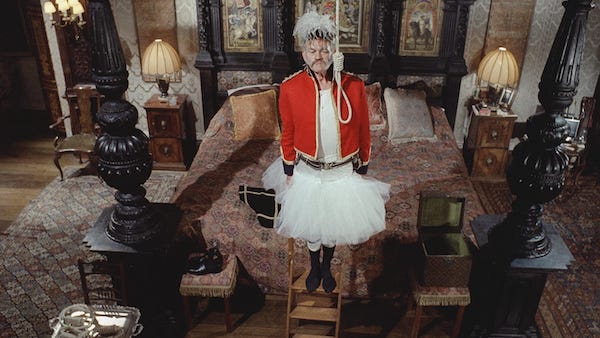Film Commentary: A Trio of Terrific Films Turn 50
Compiled by Bill Marx
Our critics salute three memorable films — antifascist (Cabaret), anticapitalist (The Ruling Class), and antiwar (Slaughterhouse-Five) — that turned 50 this year. Perfect viewing for the holidays.
Cabaret

Liza Minelli as Kit Kat entertainer Sally Bowles in a scene from Cabaret.
“Just another weekend in Weimar,” is how our very own Lord Haw-Haw, Tucker Carlson, described a drag event busted up by neo-fascists in Dallas the week of June 8, giving tacit approval to the act.
Fifty years after the release of Bob Fosse’s Weimar-era musical Cabaret, which depicted the dichotomy of what bourgeois propriety would call “decadent” entertainment and rising fascism in 1931 Berlin, we’re still … well … look out the damned window. For that matter, look at your damned Facebook feed. You know what I’m going to say. In Fosse’s adaptation of the hit play, based on Christopher Isherwood’s Berlin Stories, this dichotomy is shot directly into your amygdala. The film crosscuts between bloody Nazi street violence and showstopping musical routines at the Kit Kat Klub. One such scene features a Kit Kat Klub bouncer who ejects a Nazi, only to be pounded into ground chuck when said Nazi returns with some pals. The rhythm of the edits, the music, the blows, is masterful. The song and dance is shaped by the horror outside. “In here, life is beautiful!” croons the Kit Kat Klub emcee played by Joel Grey in the opening number “Willkommen.” Outside? Not so much.
This story revolves around expatriates — Michael York as Isherwood stand-in Brian Roberts and Liza Minelli as Kit Kat entertainer Sally Bowles — who are searching for safe harbors. It mirrors Casablanca. Music, cocktails, and nightlife offer the only refuge for the exiled. But fascism is anxious to infiltrate and destroy that security. Even the cultural legacy of Cabaret itself is being pawed at by our current contingent of fascists. Alt-right dodgeball victim Richard Spencer tried to claim as his own the Cabaret song “Tomorrow Belongs to Me,” sung in the film by Hitler Youth. For him, it was an inspirational hymn — until Spencer was slapped down by CNN contributor Jason Kander, who pointed out that his uncle, John Kander, a gay Jewish man, wrote the damned song.
Proof that, though set nearly a century ago, Cabaret confronts social issues we’re still grappling with: Grotesque wealth inequality. Cultural and religious identity. Yes, even restrictively expensive and regulated reproductive choice. I would argue that the movie speaks to audiences with a power it didn’t have when it premiered. (Yeah, 1972 was no picnic. But back then fascism wasn’t on the rise.) The film’s beauty — from Geoffrey Unsworth’s exquisite photography, which recreates Otto Dix paintings, to the choreography, to the fragility of the world it depicts — is not about escape or denial. As Sally sings in her finale, “What good’s permitting some prophet of doom? To wipe every smile away?,” Cabaret will help you face the storm that’s gathering outside with a little more strength and determination.
Novelist and critic Michael Marano first saw Cabaret ages ago on TV, and was really confused, even as a kid, about major subplots the network censors chopped for the sake of the very same bourgeois sensibilities movie stood in opposition to.
Slaughterhouse-Five

Optometrist Billy Pilgrim (Michael Sacks) in Slaughterhouse-Five.
In Kurt Vonnegut’s novel, Slaughterhouse-Five, one sentence appears over 100 times: “So it goes.” Every time death rears its inevitable head, “so it goes” pops up like a thematic twitch. Even a dog’s demise is commemorated with the phrase. Some critics lamented the device as a cute, blasé shrug in the face of endless war. It is, though, this insanely excessive repetition that makes the novel’s power possible. It weaves the crazy time-tripping concoction together, making otherworldly sense of Earth’s cruel gibberish. In director George Roy Hill’s movie adaptation, there is no narrator, and so the phrase appears exactly no times. Zero. For that, and other reasons, it is a small miracle that Slaughterhouse the film works as well as it does.
The sublimely talented Hill was a mainstream choice to direct a dour but ditsy satire by a literary eccentric. But he was the American director of the moment: the 1972 film fits between Hill’s two most celebrated works, Butch Cassidy and the Sundance Kid and The Sting. A unique mix of droll sci-fi and angry satire — framed by the imbecility of war — it is the tale of Billy Pilgrim, a dim-witted everyman “unstuck in time,” hurtling pell-mell between eras, continents, and a distant planet named Tralfamadore.
The film culminates in the brainless decimation of the beautiful, nonmilitary city of Dresden by Allied forces in 1945, an event Vonnegut witnessed himself, as a prisoner of war in Schlachthof-fünf. The time-tumbling plot line leaves the film with no dramatic momentum. But each scene is perceptively handled, so the movie doesn’t capsize.
In 1969, the novel’s popularity was boosted by anti-Vietnam war fervor; today, Ukraine is an even closer parallel to Dresden’s purposeless destruction. While many films depict the horror of war, Slaughterhouse honors its source novel by focusing on war’s unadulterated stupidity.
The movie rests on its flawless casting, with Michael Sacks as the vacant yet lovable Billy; Ron Liebman as a symbol of revenge-fueled evil; Eugene Roche as a symbol of naive goodness; Sorrell Booke as a Babbitt-like symbol of small-town capitalism; and Valerie Perrine as a naked symbol of male sexual fantasy. Every character is a broad parody, especially the women, who are all dumbly annoying (except for Perrine’s dumb angelic sexpot.) Dresden is played by Prague, since there is no Dresden left to play itself. So it goes.
— For 30 years, Daniel Gewertz wrote about music, theater and movies for the Boston Herald, among other periodicals. More recently, he’s published personal essays, taught memoir writing, and participated in the local storytelling scene. In the 1970s, at Boston University, he was best known for his Elvis Presley imitation.
The Ruling Class

Harry Andrews as the 13th Earl of Gurney prepares for masturbatory delight in The Ruling Class.
This exuberant black comedy is based on a 1968 play by dramatist Peter Barnes, part of a quartet of similarly iconoclastic British theater writers that included Edward Bond, Howard Barker, and John Arden. Once admired, they are now marginalized. English director Philip Franks, who recently staged a series of monologues by Barnes, neatly summed up why these playwrights have been kicked to the curb. “You can define why in three words: politics, philosophy, and economics. Economics because they wrote on a massive scale, so it became harder and harder to do them. Politics because they are all vocally anti-authoritarian. And philosophy because they deal with things that a lot of people really don’t like: violence, sexuality, the nature of humanity itself, value systems, political structures.”
Bond and Barker are still alive (Barnes died in 2004, Arden in 2012), but of the four this is the only film (aside from what sits in the BBC Archives) based on their work that reflects the group’s vision of a society that’s firmly under the control of laughable sociopaths. The Ruling Class pivots on the issue of insanity, giving us a paranoid schizophrenic protagonist who believes he’s God. “How do you know you are God?” he is asked. “Simple,” he replies. “When I pray to Him, I find I am talking to myself.” After a session with a therapist he is “cured” — only to become Jack the Ripper incarnate. “Whether this is Jerusalem or Babylon we know not,” wondered William Blake. For Barnes, it is a matter of a coin toss.
When the Earl of Gurney (Harry Andrews) dies in a cross-dressing accident — see above photo — his son, Jack (Peter O’Toole), inherits the splendid Gurney estate. Figuring they can prove that Jack is mentally unfit to own the manse, the Gurney family plots to steal his inheritance. As their plots and counterplots fail, the family relieves their saintly target of his illusions of transcendence, with horrific results. Out of this yo-yo conceit Barnes concocts a zany but pointed farce, a fierce takedown of the aristocracy, the British class system, flower power, Capitalism, Communism, Christianity, and psychoanalysis. Contemporary critics, tempted to dismiss Barnes’s fevered ridicule as cartoonish, dated ’60s overreach, need only direct their attention to the slapstick mental state of the various billionaires and politicos who are currently ruling our national/international roosts.
Peter O’Toole gives a wonderfully athletic performance as Jack, and the ace supporting cast features Alastair Sim, William Mervyn, Coral Browne, Harry Andrews, Carolyn Seymour, James Villiers, and Arthur Lowe. My main reservation is that, at times, director Peter Medak’s 1972 adaptation (with the playwright) is sloppy and haphazard. Material this crazed calls for a scalpel rather than an axe — why lean into the silliness? Still, 50 years on, the film’s attack on the inevitable madness of authority remains both hilarious and disturbing, which is just what Barnes wanted, “a drama of extremes, trying to illuminate the truth as contradictory. Instead of eliminating those contradictions as untrue, they are emphasized; melancholy and joy, tragedy and comedy, the bathetic and the sublime are placed side by side. The similarity of such opposites is shown by such juxtapositions.”
I highly recommend the Criterion Collection edition of The Ruling Class: it features a 16 x 9 widescreen digital transfer, supervised by Medak, and offers the original full-length version of the film, never before available in the US.
— Bill Marx
Tagged: Cabaret, Daniel Gewertz, Michael Marano, Slaughterhouse Five

Oh man did this post ever depress me. All three of these films are better than anything I’ve seen in 2022. And there’s so much MORE from 1972. Mainstream releases included The Godfather, Deliverance, Frenzy, What’s Up Doc, and The Candidate, and in the arthouse (or on the fringe) there was an amazing variety: Solaris, Aguirre, Last Tango in Paris, Cries and Whispers, Fellini’s Roma, The Discreet Charm of the Bourgeoisie . . . You’d have to look at the last FIVE years to match that single year, and even at that you would not match its best.
I suggested to my film club that they see The Ruling Class. We watched it. They all hated it. I was taken aback. Generally, there are disagreements, but a good discussion can be had. That didn’t happen.